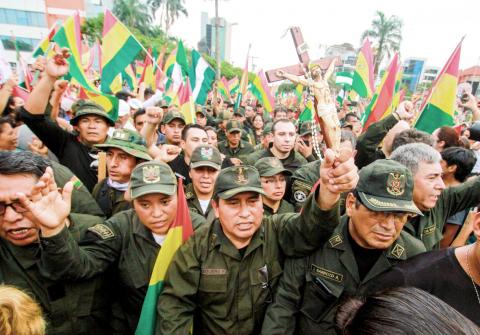Bolivian President Evo Morales has resigned, caving in after three weeks of sometimes violent protests over his disputed re-election.
“I resign my post as president,” Morales said on Sunday in a televised address, capping a day of fast-moving events in which many ministers and senior officials quit as support for Latin America’s longest-serving president crumbled, and created a temporary leadership vacuum in the country.
The streets of La Paz immediately exploded in celebration, with jubilant Bolivians waving the national flag, but violence and vandalism later erupted overnight and in the neighboring city of El Alto.

Photo: AFP
In the confusion, a group of 20 lawmakers and government officials took refuge at the Mexican ambassador’s residence, and Mexico announced it was offering asylum to Morales as well.
Morales later tweeted that there was a warrant for his arrest, but Bolivian Police Commander General Vladimir Yuri Calderon told local Unitel television that was not the case.
Police on Sunday night announced that they had arrested Maria Eugenia Choque, the head of the nation’s electoral court, an institution slammed by the opposition as biased.
Morales gained a controversial fourth term when he was declared the winner of the Oct. 20 presidential election by a narrow margin.
However, the opposition said there was fraud in the vote count and three weeks of street protests ensued, during which three people died and hundreds were injured.
The Organization of American States carried out an audit of the election and on Sunday reported irregularities in just about every aspect that it examined: the technology used, the chain of custody of ballots, the integrity of the count and statistical projections.
As chanting Bolivians kept up the street protests, Morales called new elections, but this was not enough to calm the uproar.
The commanders of the armed forces and the police joined the calls for the president’s resignation.
A raft of ministerial resignations followed Morales’ announcement and raised the question of who was in charge. His vice president, Alvaro Garcia Linera, also said he would quit, and the head of the Senate, Adriana Salvatierra, resigned.
Second Vice President of the Senate Jeanine Anex said she would assume the interim presidency of Bolivia.

BUILDUP: US General Dan Caine said Chinese military maneuvers are not routine exercises, but instead are ‘rehearsals for a forced unification’ with Taiwan China poses an increasingly aggressive threat to the US and deterring Beijing is the Pentagon’s top regional priority amid its rapid military buildup and invasion drills near Taiwan, US Secretary of Defense Pete Hegseth said on Tuesday. “Our pacing threat is communist China,” Hegseth told the US House of Representatives Appropriations Subcommittee on Defense during an oversight hearing with US General Dan Caine, chairman of the Joint Chiefs of Staff. “Beijing is preparing for war in the Indo-Pacific as part of its broader strategy to dominate that region and then the world,” Hegseth said, adding that if it succeeds, it could derail

CHIP WAR: The new restrictions are expected to cut off China’s access to Taiwan’s technologies, materials and equipment essential to building AI semiconductors Taiwan has blacklisted Huawei Technologies Co (華為) and Semiconductor Manufacturing International Corp (SMIC, 中芯), dealing another major blow to the two companies spearheading China’s efforts to develop cutting-edge artificial intelligence (AI) chip technologies. The Ministry of Economic Affairs’ International Trade Administration has included Huawei, SMIC and several of their subsidiaries in an update of its so-called strategic high-tech commodities entity list, the latest version on its Web site showed on Saturday. It did not publicly announce the change. Other entities on the list include organizations such as the Taliban and al-Qaeda, as well as companies in China, Iran and elsewhere. Local companies need

CRITICISM: It is generally accepted that the Straits Forum is a CCP ‘united front’ platform, and anyone attending should maintain Taiwan’s dignity, the council said The Mainland Affairs Council (MAC) yesterday said it deeply regrets that former president Ma Ying-jeou (馬英九) echoed the Chinese Communist Party’s (CCP) “one China” principle and “united front” tactics by telling the Straits Forum that Taiwanese yearn for both sides of the Taiwan Strait to move toward “peace” and “integration.” The 17th annual Straits Forum yesterday opened in Xiamen, China, and while the Chinese Nationalist Party’s (KMT) local government heads were absent for the first time in 17 years, Ma attended the forum as “former KMT chairperson” and met with Chinese People’s Political Consultative Conference Chairman Wang Huning (王滬寧). Wang

CROSS-STRAIT: The MAC said it barred the Chinese officials from attending an event, because they failed to provide guarantees that Taiwan would be treated with respect The Mainland Affairs Council (MAC) on Friday night defended its decision to bar Chinese officials and tourism representatives from attending a tourism event in Taipei next month, citing the unsafe conditions for Taiwanese in China. The Taipei International Summer Travel Expo, organized by the Taiwan Tourism Exchange Association, is to run from July 18 to 21. China’s Taiwan Affairs Office spokeswoman Zhu Fenglian (朱鳳蓮) on Friday said that representatives from China’s travel industry were excluded from the expo. The Democratic Progressive Party government is obstructing cross-strait tourism exchange in a vain attempt to ignore the mainstream support for peaceful development